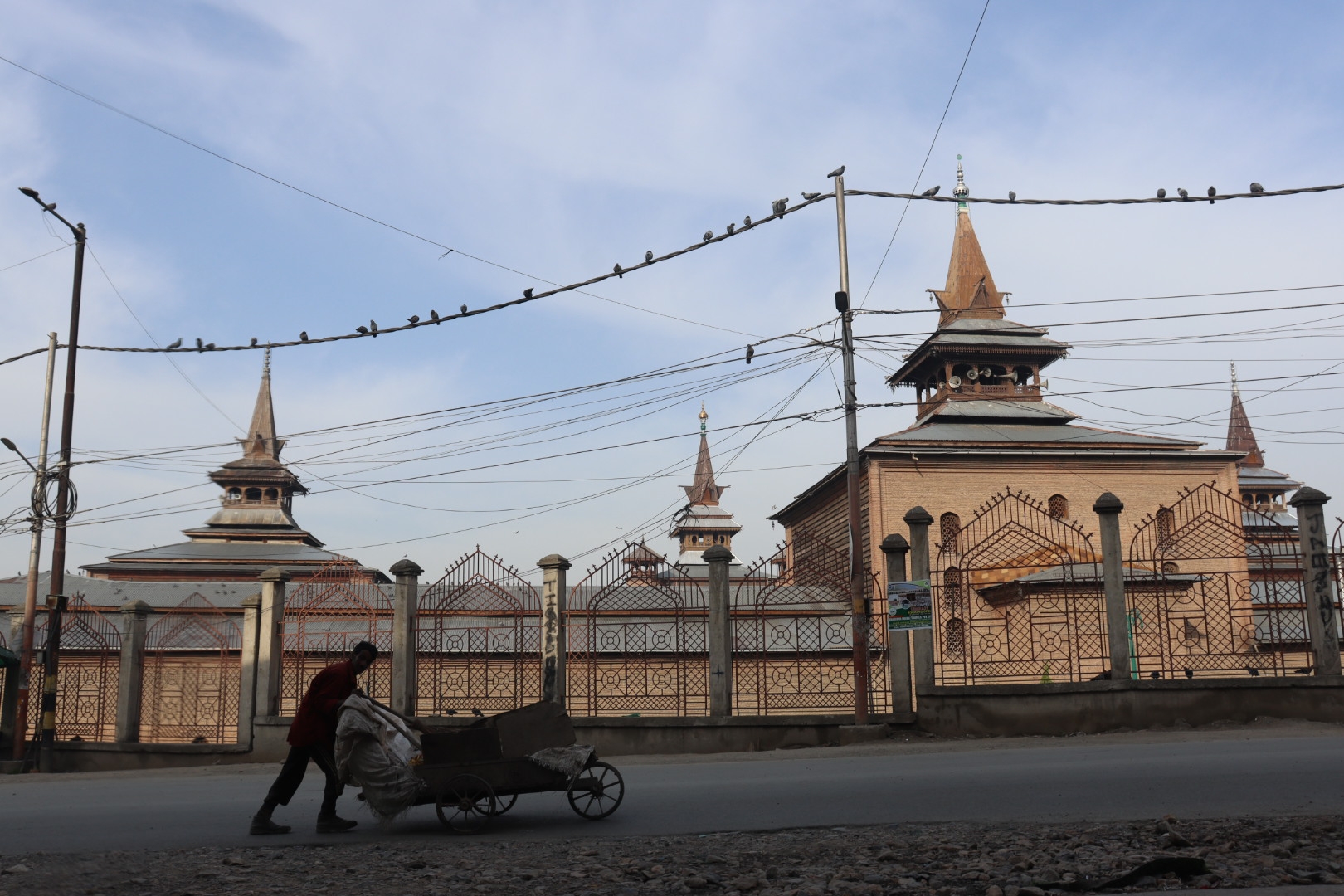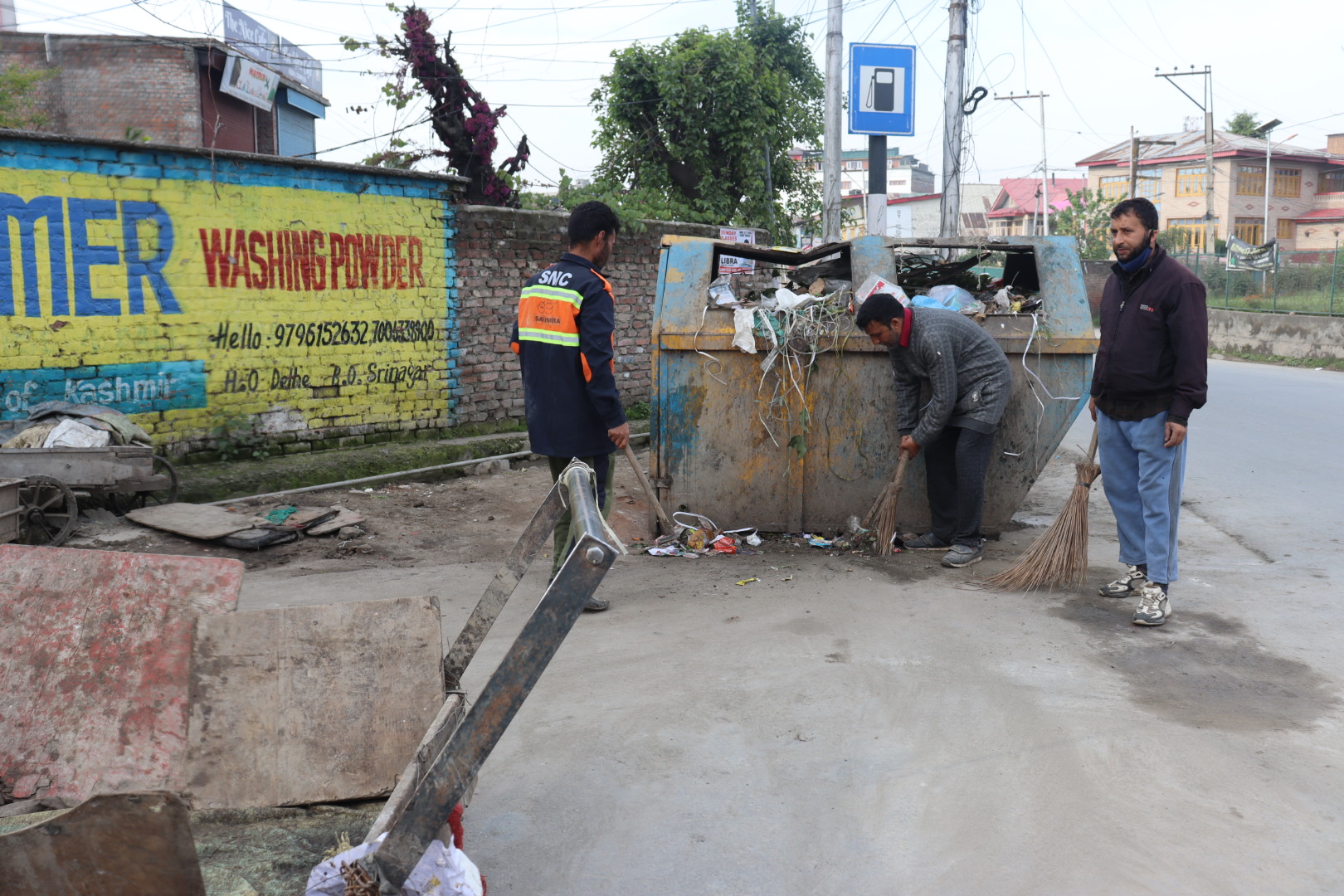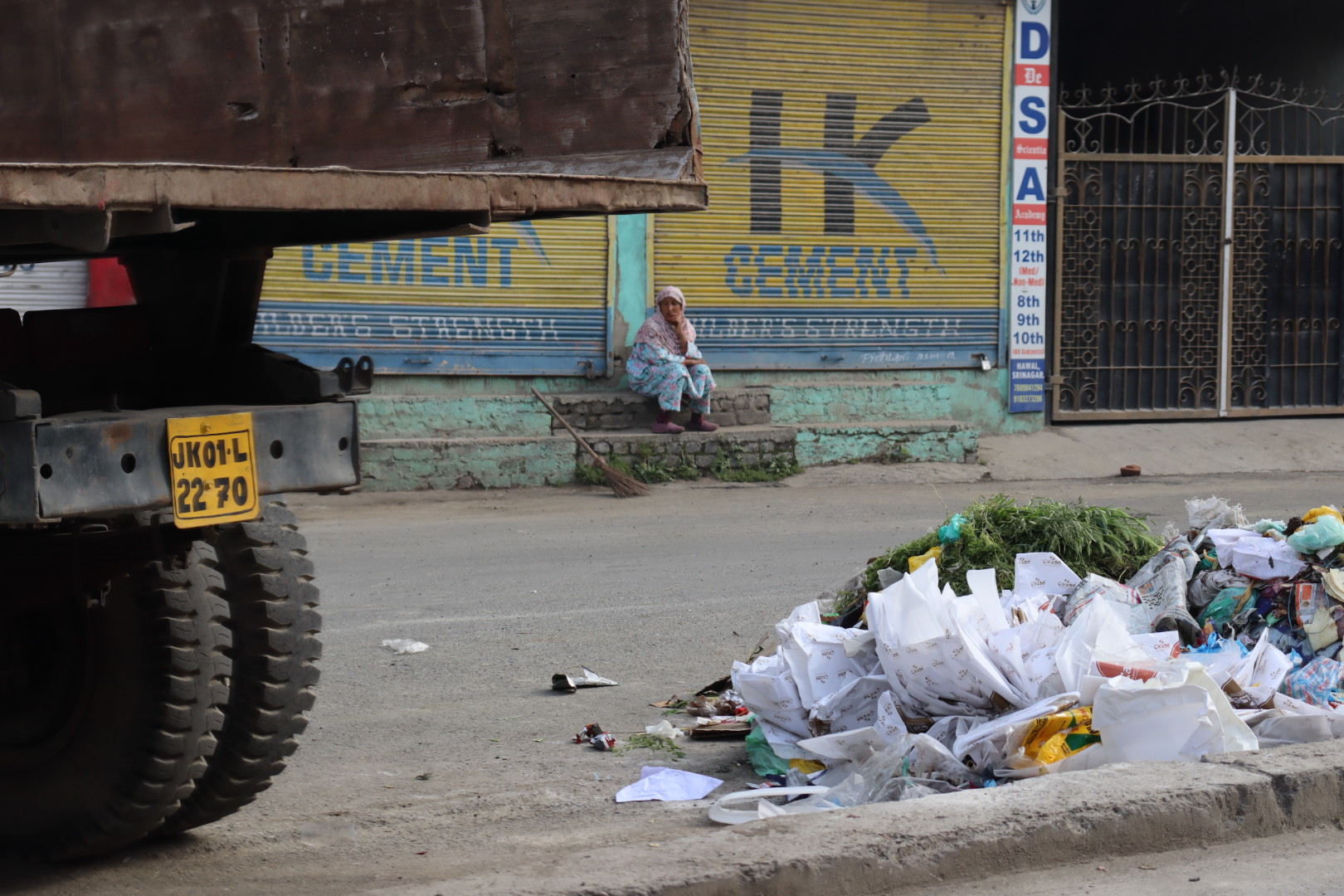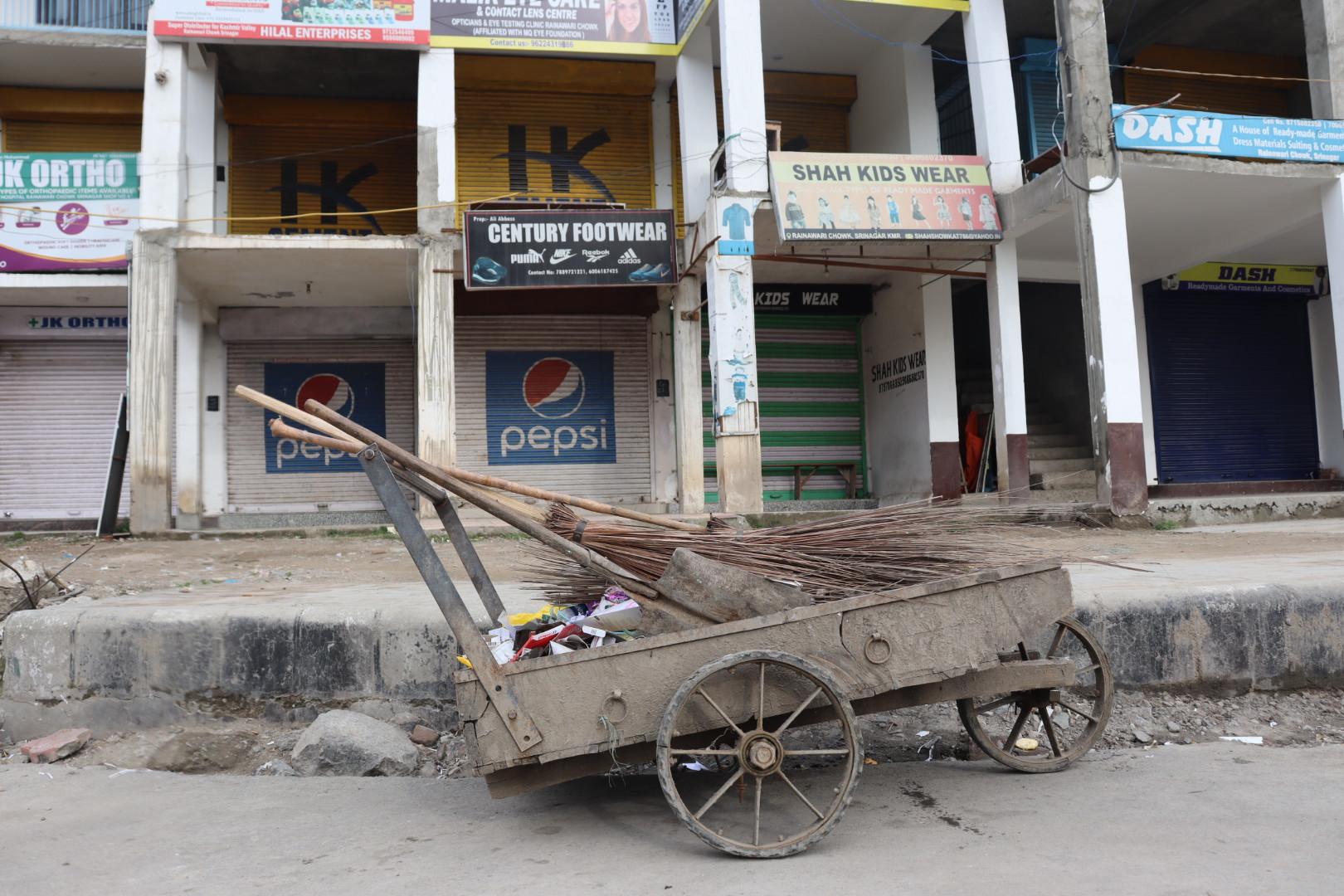Unsung heroes of Kashmir: A peep into the lives of socially outcast, untouchable and underprivileged Sheikhs

Sualiha Zubair, Irshad Fayaz, TwoCircles.net
Srinagar: In the valley of Kashmir, amid the snow-capped mountains and lush green plains, exists a disadvantaged community historically overlooked and marginalized — the underprivileged sweeper community. For decades, the Sheikh (traditionally sweepers) community has remained the backbone of sanitation maintenance, yet their struggles continue to be unnoticed and their stories untold.
According to Adil Ahmed, a 35-year-old sweeper residing in Srinagar's Hawal area, nearly 20-25% of the valley’s total population belongs to this outcast community and works as sweepers. However, despite their significance, the community grapples with challenges stemming from governmental neglect as well as societal pressures.
“Most of the sweepers work tirelessly as daily wagers, earning a meagre salary of Rs 9,000,” said Ahmed with disappointment. “The earnings barely suffice for the basic necessities of feeding our families, educating children, accessing healthcare or saving for unforeseen adversities.
According to him, those sweepers who manage to save modest sums after years of hard work often find themselves back to square one in their later years as exposure to waste over prolonged periods leaves them susceptible to diseases, erasing any financial stability they may have attained.
Echoing similar sentiments, many other sweepers voice grievances about the alleged lack of attention to their well-being by the government and concerned department.
They highlight the dearth of essential sanitation provisions on a daily basis such as masks and gloves. “We are deprived of basic necessities like regular medical check-ups and essential medications,” complained Ahmad’s friend, who wished to remain anonymous.
“Even after dedicating two decades to this laborious job, if illness strikes, we are quickly replaced without any aid or compensation,” he said.
Their day starts at 4 am after morning prayers. They meticulously clean every nook and corner of their designated area by collecting household garbage and sweeping the roads. Following this rigorous task, they then report to their respective offices by 9 am, ready to promptly reach any area where they are summoned.
Their working hour concludes late in the evening with a commitment to wake up next morning, grasping their brooms and continuing their noble task.
However, underscoring the disregard for emotional and physical well-being of sweepers by their department, the sweepers admit facing difficulties in getting their emergency leaves sanctioned. They also claim that they are not being provided enough holidays on festivals such as Eid while high-ranking officials spend quality time with their families at home. “We are compelled to abandon our personal lives," said Ahmad with rage. "Even in the event of a family tragedy, we are called back to duty the very next day," he adds.
Most of the sweepers from the Sheikh community live in Watal colony, a crowded settlement of more than 500 households located in Srinagar's downtown area. In Kashmiri language, the term Watal refers to people associated with sweeping, cleaning or a cobbler's jobs.
Similarly, Sheikh when used as a suffix, indicates economically backward people whose occupations are considered menial. The sweepers who take care of the valley’s cleanliness struggle with the basic necessities like clean water, electricity and adequate sanitation facilities back home.
[caption id="attachment_449771" align="aligncenter" width="1620"] Ghulam Mohammad Sheikh along with his other co workers putting the Rag in a Dustin at Rainawari area of Srinagar, jammu and kashmir. Photo:- Irshad Fayaz[/caption]
Ghulam Mohammad Sheikh along with his other co workers putting the Rag in a Dustin at Rainawari area of Srinagar, jammu and kashmir. Photo:- Irshad Fayaz[/caption]
Discrimination and social stigma
While conversing with the sweepers, it is understood that being unacknowledged and undervalued from the common people upsets them more than the workplace challenges. The community members believe that irrespective of their service, it is the societal indifference and ingrained prejudices that finally define the public's behaviour with them.
According to Ghulam Mohammad Sheikh, 45, the average life expectancy of sweepers becomes half of the general population because of the kind of work they do and its associated implications.
He emphasizes the pain of lack of recognition from the very people they serve. "Some people view us as dirty or filthy while the filth and dirt originate from their own homes, which we are tasked with cleaning,” he says.
Highlighting the unjust prejudices they allegedly face on a daily basis at the hands of people, Sheikh recounts an incident encountered by one of the members of his community in Srinagar. “Recently a fellow sweeper entered a house to collect wastes from a dustbin. Unfortunately, a thief stole a gas cylinder from the house. Despite the sweeper’s repeated pleas of innocence, the family was quick to accuse him and fight with him,” he recalls.
Sheikh says that following the incident, the higher authorities instructed them to refrain from entering households directly. However, Sheikh says as they no longer enter anyone’s houses, people now lodge complaints with the municipal corporation, accusing the sweepers of being negligent.
“In addition to these challenges, there have been instances where sweepers have faced physical violence over trivial disputes, simply because some individuals believe it is their right to oppress our community,” he adds.
Regarding the institution of marriage, members of the sweeper community express a mixed reality of progress and lingering discrimination. "We wouldn't say that everything remains unchanged from years ago in Kashmir," remarks Ahmad. "Today, inter-caste marriages within our community have taken place, and those couples are leading content lives. Families with broader perspectives have begun accepting our sons and daughters, integrating them seamlessly into their families," he elaborates.
However, he adds that there still exist a good number of people in society who regard them as misfits.
Nevertheless, Ahmad emphasizes a fundamental belief shared among the community that in God’s eyes everyone is a human first, transcending labels of caste or social status, and there is no ground for discrimination when everybody was created equally by one Almighty.
“We find peace knowing that in front of Him (God), we are not a Peer, a Sheikh or a Dar, we are just his beloved creation,” declares Ahmad with conviction.
Women in the community
The women make up almost half of the sweeper community in Kashmir. Despite facing numerous challenges, these women have embraced their roles. Through their hard work, they not only maintain cleanliness but also break stereotypes in traditionally male-dominated society.
Taja Begum, 45, a sweeper and a mother of five, sheds light on the active participation of women sweepers in the valley. While talking about the multi-tasking skills of women, she says that it is challenging to juggle multiple responsibilities such as managing household chores and leaving young children behind to attend to duties. She explains that striking a balance is imperative because providing sustenance for families is a priority.
[caption id="attachment_449770" align="aligncenter" width="1620"] Taja begum rests after cleaning the roads and Drainage lines at Sazgaripora area of central Kashmir's district Srinagar. Photo:- Irshad Fayaz[/caption]
Taja begum rests after cleaning the roads and Drainage lines at Sazgaripora area of central Kashmir's district Srinagar. Photo:- Irshad Fayaz[/caption]
"Women are integral to this workforce. We carry out our tasks with utmost sincerity, standing shoulder to shoulder with men. Not once do we shy away from our responsibilities," she says proudly.
Underlining the need and commitment of women sweepers, she particularly highlights the vital role of women in hospitals, especially in gynaecological departments and labour wards. “Women sweepers play a noteworthy part in the cleanliness of these crucial environments. Round the clock, we ensure that people, especially other women, do not encounter unnecessary challenges while they are going through an important phase of their life,” she explains.
However, recalling her lifelong experiences, Begum reveals the persistent discrimination she endured from a young age. "During weddings, we are called to manage cleanliness and dispose of waste, yet during mealtimes, we are segregated and provided with separate plates," she expresses.
She concludes the conversation with a smile as she prays and aspires for her children. "As a mother, my sole wish is for my children to lead better lives than mine. But above all, I yearn for them to receive the respect they deserve, long overdue," she says.
Challenges of the children
For the children of the sweeper community, accessing education is a formidable challenge. Limited financial resources, coupled with societal barriers, often force them to drop out of schools in order to support their families. While some Sheikh families manage to send their children to school, for many, this remains a distant dream. As a result, illiteracy rates remain high within the community.
Sheikh while expressing the financial strain says,"We cannot afford the fees of private schools. The government could have provided some relief to our children, enabling them to access education like their peers, yet they never did.”
[caption id="attachment_449769" align="aligncenter" width="1620"] Sweepers Garbage cart filled with Rag collected from Roads at Khanyar area of Srinagar, jammu and kashmir. Photo:- irshad Fayaz[/caption]
Sweepers Garbage cart filled with Rag collected from Roads at Khanyar area of Srinagar, jammu and kashmir. Photo:- irshad Fayaz[/caption]
With a sarcastic tone, he adds that education is not even a concern anymore among their community, instead it is the exorbitant expenses associated with children's weddings.
Similarly, Adil highlights the emotional toll on the children in the Sheikh community. According to him, these children yearn to pursue education, but witnessing their parent’s struggles to make ends meet, they perceive their schooling as a burden on the family.
“Many abandon their studies to seek labor-intensive jobs to support the household. They kill their dreams,” he says, hence perpetuating a cycle where education and better opportunities remain elusive to this sect.
While sharing the aspirations, the sweeper community remarks that after giving 15 plus years of service, they could at least dream of getting permanent status in their jobs and enjoying the benefits that come with it.
"We aren't asking for anything extraordinary, just our rightful entitlement,” they say
Unshaken Dignity
Despite the adversities they face, members of the sweeper community exhibit remarkable resilience and pride. Their stories are testaments to the self- esteem they have for their marginalized community.
While reflecting on the same, Ahmad says, “I believe we are just as crucial to society as any other professionals, if not more. Without us, the very essence of city life would diminish. We enable people to traverse freely, perform their daily routines and maintain a healthy environment.”
He adds that the Sheikh community has and will be grateful to God for being the chosen one to serve the society. “Sooner or later, the people will realize our worth and give us the long-due respect,” he concludes.
